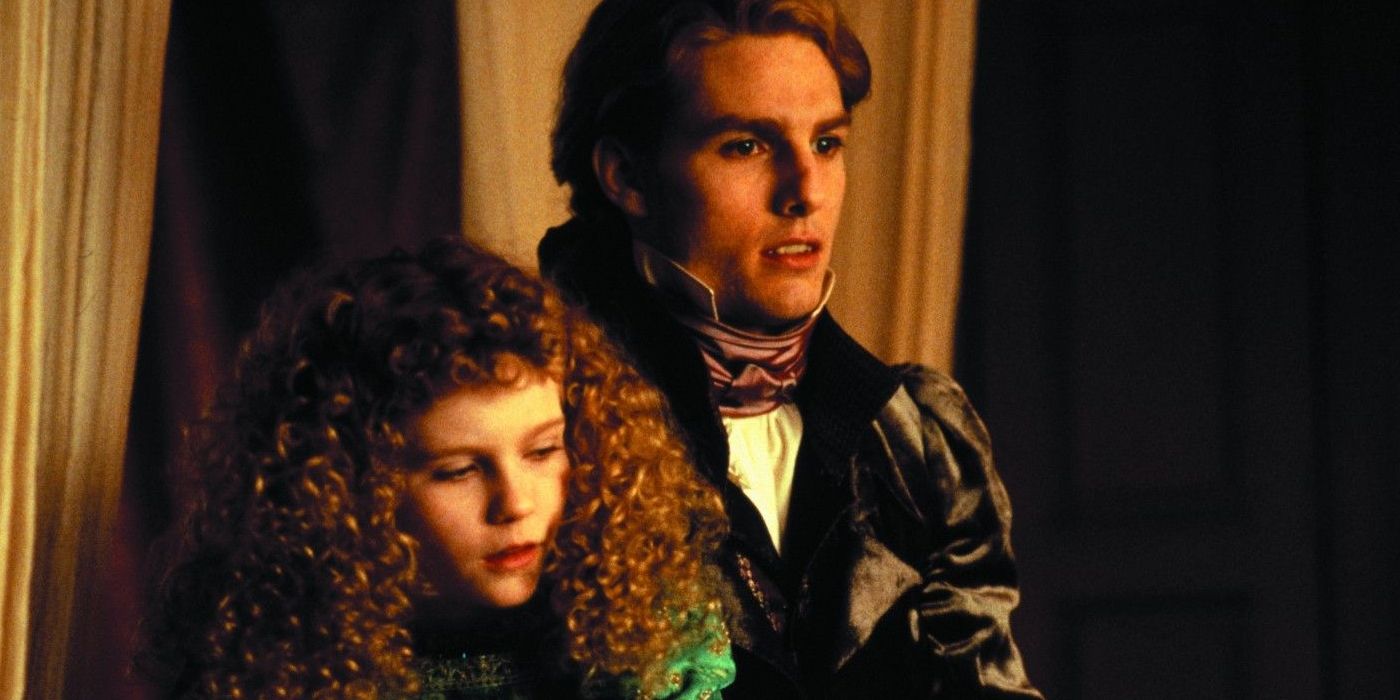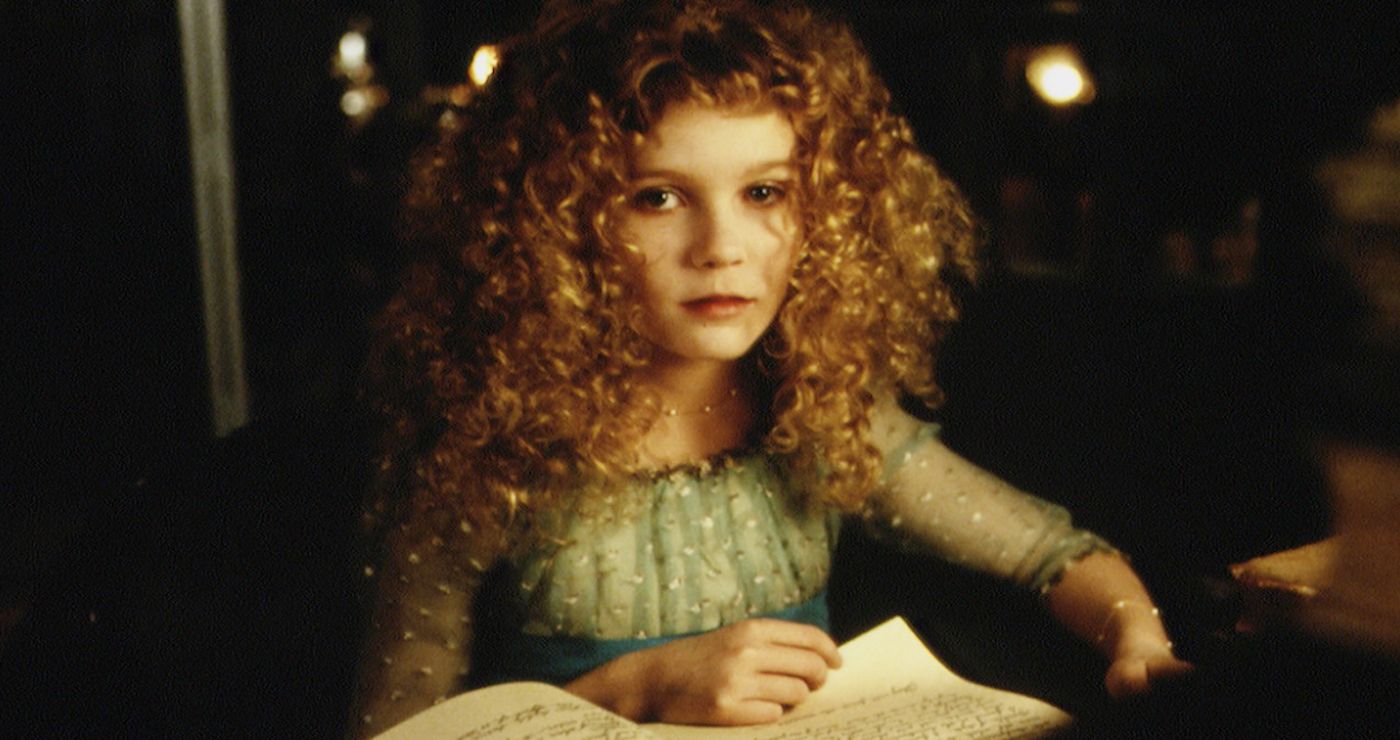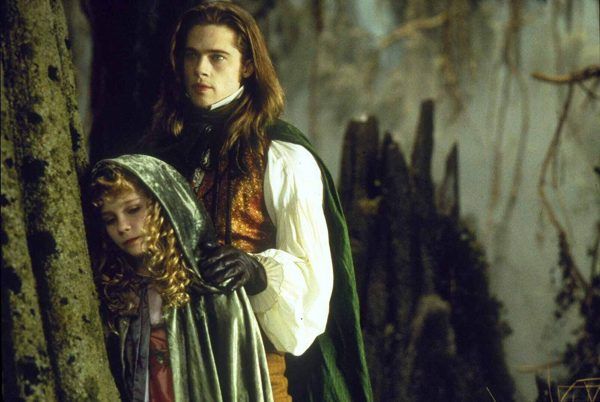Everyone, at some point, has imagined how cool it would be if they were a vampire. Not the freaky Nosferatu kind, but classy, romantic creatures of the night like those in the late, great Anne Rice's Vampire Chronicles series. A cultural phenomenon that many hold deep in their hearts to this day and inspiring creatives years later, allowing those usually seen as the monsters to tell their own story as sympathetic characters rather than seductive or monstrous villains.
Released in 1994, Interview With The Vampire exploded onto the screen with a star-studded cast and hot off the heels of Bram Stoker's Dracula. Louis de Pointe du Lac (Brad Pitt) tells his afterlife story to an intrepid journalist (Christian Slater), the story of a man turned into a vampire at the end of the 18th century by the charismatic Lestat de Lioncourt (Tom Cruise) as they gallivant around New Orleans and Paris with their surrogate daughter, the vampiric and eternal child, Claudia (Kirsten Dunst). It is a film dripping with style and melodrama, with Dunst's performance being a total breakthrough. She was only twelve years old when she played this part, and it certainly earns its place in the pantheon of brilliant child performances: she displayed the intense emotion and instability required for such a tragic and terrifying character, and still remains one of the most memorable and beloved parts of the whole franchise.
Despite only appearing in one novel of The Vampire Chronicles, dying before the end of the film, Claudia remains one of the most fascinating, terrifying vampires ever put on screen. Why does a bloodsucking little tyke linger in the minds of vampire loving audiences everywhere? The performance is one, of course, but with the new AMC series, and a new Claudia, just around the corner, let's go deeper into why she's so terrifying.
Killer Kids of Cinema
Children are a staple in horror, whether they're the victim you worry the most about, or a monster that really messes with your head. Many films regarded as the scariest of all time, such as The Omen, The Ring, and The Exorcist revolve around the corruption of the most innocent stage of humanity. There are two sides to why children can be very reliably used for horror. First, there is an urge among the majority of humanity to protect children because they're so new to the world, vulnerable to the dangers that lurk around every corner and needing guidance through life. This can be the perfect cover for a dangerous child in a horror movie, using that to lure people in or evade suspicion because after all, they're just a kid. Claudia takes full advantage of this when she hunts for blood, being dressed like a porcelain doll with pastel dresses and coiled golden hair, to really express the pretense of innocence and naivety.
Secondly, and we all think it in our heads when we see a monstrous child on the screen: We should be able to physically overtake them. Children are small, and they are vulnerable, and it should be easy to get the upper hand over them. Whether they have some form of supernatural intervention, or are just an adult in a child's body such as Esther of Orphan or Claudia, it doesn't seem to work. No one wants to have to kill a child; evil or not, the idea is genuinely quite distressing. That is the best weapon Claudia has in her arsenal. You don't want to meet her in a dark alleyway when she hasn't yet fed. You'll see a little girl in an adorable lace dress, crying because she lost her mother, and once you get close to her, it's too late.
Never Grow Up
As advantageous as it is, there are reasons why, in the lore of the movie, it is forbidden to turn a child into a vampire. The biggest selling point of being a vampire is immortality, being in the prime of your life eternally. Childhood is not the prime of your life, your mind and body are entirely underdeveloped, so imagine being stuck that way. The canonical reason in The Vampire Chronicles is that children should not be turned because of their dependence on others, the expectation being that vampires should be able to take care of themselves, and a vampire child will constantly be in danger. Claudia herself is a cautionary tale of why this rule is in place, but it runs much deeper than that, especially because of her position as a constant band-aid baby in the fraught relationship of Louis and Lestat.
Put yourself in her shoes. In the new AMC show, Claudia, now played by Bailey Bass, is about fourteen years old when she's turned. That's still pretty bad - imagine being pubescent forever - but in the movie she's only ten. Ten years old, forever. Part of Claudia still mentally grows up, she gains the knowledge and the intellect of an adult, and wishes to be perceived as such, but her attempts to look more grown up by wearing adult clothes only earns her odd looks on the streets. She can learn all the skills she wants, but she will always be patronized and seen as less than because of her perceived youth. She's treated as nothing more than the dolls she's dressed up as by her surrogate fathers. Especially Lestat, who does not take her anger seriously even as decades pass, and she knows she should be an adult in mind and body. Her power is permanently taken away from her, so it is no wonder that she very quickly, and very violently, snaps. We all fear being vulnerable, being seen as weak and having those weaknesses exploited. Claudia has all the strengths that come from being a vampire, eternal youth, eternal time, but it takes away her greatest yearning: to grow up.
Her biggest strength as a killer turns the dream of immortality into a nightmare, not just for her, but for those watching the film wondering, "What if that were me?"
These two elements combined is what makes Claudia not only conceptually and existentially terrifying, but also the ultimate vampire. Claudia never lived a human life, unlike Lestat and Louis, who experienced their childhood and adolescence as mortal men. She only lived ten years, and, considering her low economic status, the time period in which she lived, and suffering through a plague, it was barely a life at all. She was only born a human, but she was raised a vampire, as Louis' daughter and Lestat's pupil. Louis and Lestat deal with their undeath in their own ways, one with melancholy and reluctance and the other with reckless bravado. Claudia has to deal with being a child forever, but she did not have to cope with the bloody side of vampirism. It's a game to her. Human life very quickly becomes trivial, and she all too comfortably settles into her role. Her brain developed without the moral dilemma of killing, and it developed in an environment where she learned not only to hunt, but to manipulate those around her, using her innocence to bring people to her side. Claudia may look small, and it may torture her, but she is an apex predator at heart.
Everyone, at some point, has imagined how cool it would be if they were a vampire. Claudia shows us the real terror of such an existence, and how terrifying a vampire can be.



